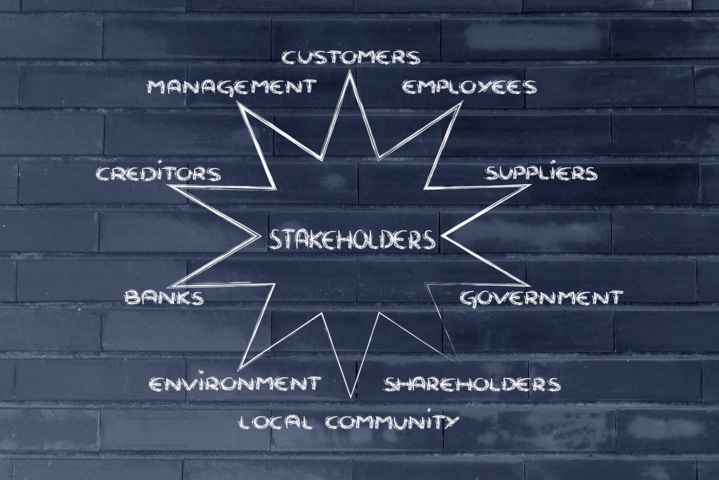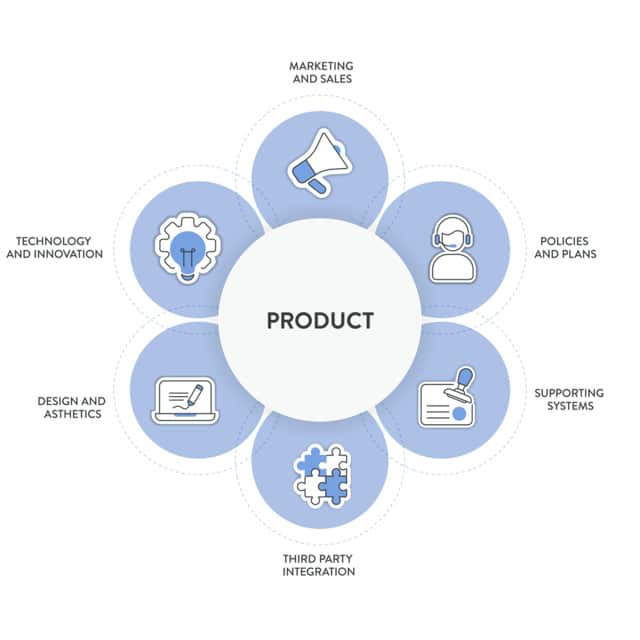Explore the world of Enterprise Sales and unlock success with expert tips on developing a winning Enterprise Sales Strategy. Whether you’re a seasoned sales professional or just starting out, our guide provides valuable insights into the nuances of selling to large corporations.
The art of selling requires different levels and types of strategies if you wish to succeed as a sales professional. If you think that you can use the same technique you know when selling the latest mobile phone to an individual customer versus selling Enterprise Resource Planning (ERP) software to a large corporation, think again. Enterprise sales require a specific skill set and different sales strategies to attract prospects, close deals, and maintain long-lasting relationships.
In this article, we will discuss everything you need to know about the fundamentals of enterprise sales. Whether you want to expand your skills and knowledge as a sales representative or you are exploring enterprise sales jobs in Dallas, you will learn how enterprise sales is compared to B2C and B2B sales, why developing a sales strategy for enterprise market is necessary, and how to succeed in enterprise selling.

But First, What is Enterprise Sales?
Simply put, enterprise sales is selling products or services to large corporations or enterprise-level clients. The typically complicated process it encompasses, including long sales cycles, procurement of large contracts, communicating with various stakeholders, multiple rounds of negotiations, and a higher level of risk than traditional sales, also earned it the nickname “complex sales.”
Unlike selling to individual customers, startup businesses, and small or medium-sized companies, enterprise sales is not transactional. Rather, it’s more of building deep and personalized relationships with prospects, even if it takes months going back and forth to discuss with stakeholders, hash out details of the sale, and overcome different objections. The products or services being sold in enterprise sales often have a high price point, which is why it involves significant customization, integration, and support.
How to do enterprise sales? What makes a particular project require enterprise-level selling? To help you recognize and distinguish an enterprise sales model, below are its key features and characteristics you should know:
1. It has longer sales cycles compared to traditional sales.
Due to the complexity of the sale, the need for careful evaluation, and multiple rounds of discussion and negotiation, enterprise sales cycles are often longer than those for smaller businesses.
2. It involves a complex decision-making process.
Enterprises typically have multiple decision-makers involved in the purchasing process, including executives, department heads, IT professionals, and other stakeholders. Thus, you as the salesperson, would have to navigate these complex decision-making dynamics and come up with a strategy that will lead them to say yes to your proposal.
3. It requires customization and integration.
Enterprise customers often require products or services to be customized to fit their specific needs and integrated into their existing systems and processes. A one-size-fits-all approach doesn’t normally work In enterprise sales.
4. It involves high-ticket products or services.
With enterprise sales, you deal with higher-value contracts as the products or services being sold are often more comprehensive and geared towards addressing the broader needs of the organization.
5. It requires a consultative sales approach.
For enterprise sales to be successful, you have to offer a consultative approach, where you, as the salesperson, become a trusted advisor to your prospect, understanding their corporation’s challenges and needs, and offering solutions accordingly.
6. It demands stronger and more personalized relationship building.
The goal of enterprise sales is to close the deal and convert the prospect into a loyal client. Thus, building strong relationships with key stakeholders is crucial. You have to gain their trust and establish credibility, even if it means wooing them for months and giving in to their requests.
7. It comes with after-sales support.
Because of the high-value contract, enterprises expect a high level of ongoing support not only from the sales representative but also from the organization that sold them the product or service. You have to treat them as VIPs and make them feel that their business is valuable to your team, providing them with exhaustive training, implementation assistance, and technical support even after the sale is made.
8. It requires strong negotiation skills from the sales professional.
Negotiating complex deals, contract terms, and pricing structures are common aspects of enterprise sales. If you wish to succeed in this role, you have to be willing to learn and master the art of negotiation. Here are key strategies sales professionals should know to master the art of negotiation.
9. Enterprise sales is solution-oriented selling.
Enterprises are often looking for comprehensive solutions that solve multiple problems, making enterprise sales solution-oriented. Unlike a transactional approach for consumer product sales, you need to position your offerings as a solution that addresses the corporation’s pain points.
10. Finally, enterprise selling requires sales professionals to have ample industry knowledge.
It would be difficult for you to handle an enterprise sales role without having a deep understanding of the industry and market in which your prospective clients operate. Thus, you have to be engaged in the position and learn about the industry you’re in to be able to speak the client’s language and provide them with valuable information and solutions.
For aspiring sales professionals and seasoned sales executives, working an enterprise sales job can be highly rewarding but also challenging due to the intricacies involved, especially since it is quite different from traditional sales methods and strategies. The enterprise sales team, therefore, would have to collaborate closely with other departments, such as marketing, product development, and customer support, to ensure a seamless experience for the enterprise-level clients.
B2C Sales vs. B2B Sales vs. Enterprise Sales
The main difference between business-to-consumer (B2C), business-to-business (B2B), and enterprise sales lies primarily in the specific market segment each sales approach targets. For instance, B2C sales refers to selling goods or services to individual consumers, while B2B sales refers to transacting with another business or company. The enterprise sales meaning, as we have already discussed above, refers to the process of selling products, services, or solutions to large corporations and enterprises.
To dig deeper into the distinctions among these three different sales approaches, here is a comprehensive comparison based on several factors:
1. B2C (Business-to-Consumer) Sales
- Target Audience: B2C sales involve selling products or services directly to individual consumers.
- Volume and Scale: Transactions in B2C sales are often smaller in value, but the volume can be much higher due to the larger consumer base.
- Purchasing Decision: The purchasing decision is typically made by an individual consumer or a small group of consumers.
- Sales Process: B2C sales processes are generally shorter, as they don’t involve complex negotiation or customization.
- Marketing Focus: B2C marketing often focuses on emotional appeal, brand recognition, and consumer preferences.
2. B2B (Business-to-Business) Sales
- Target Audience: B2B sales involve selling products or services to other businesses or organizations.
- Volume and Scale: While individual transactions might be of higher value compared to B2C, the volume of transactions is typically lower.
- Purchasing Decision: B2B purchases usually involve multiple stakeholders, including executives, managers, and procurement teams.
- Sales Process: B2B sales can have longer sales cycles due to the need to build relationships and address specific business needs.
- Customization and Integration: B2B sales often require tailoring products or services to fit the business’s operational requirements.
- Marketing Focus: B2B marketing focuses on demonstrating the value of the product or service to solving business challenges.
3. Enterprise Sales
- Target Audience: Enterprise sales specifically target large corporations and organizations.
- Volume and Scale: Enterprise sales involve higher-value contracts and complex solutions.
- Purchasing Decision: The decision to close the deal and purchase in enterprise sales is made by multiple decision-makers, including executives, department heads, and IT professionals.
- Sales Process: Enterprise sales have the longest sales cycles due to the need to navigate complex organizational structures and tailor solutions to the enterprise’s unique needs.
- Consultative Approach: Enterprise sales require a consultative and solution-oriented approach, as enterprises are looking for comprehensive solutions.
- Relationship Building: Building strong relationships is crucial for establishing trust and credibility.
- After-Sales Support: Extensive after-sales support, including training and technical assistance, is often required.
- Examples of Enterprise Sales: ERP (Enterprise Resource Planning) Software, CRM (Customer Relationship Management) Solutions, Cloud Computing Services, Data Analytics Platforms, HR (Human Resources) Management Software, Business Intelligence Tools, and Enterprise Mobility Solutions among others
Due to their difference in target audience, each of these sales models requires different sales techniques. If you are new to enterprise sales and you want to succeed in this role, developing a solid enterprise sales strategy can help you handle objections, close more deals, and turn prospects into long-term clients.

Enterprise Sales Cycle: How Does It Look Like?
To help you effectively navigate the multifaceted landscape of enterprise sales, you have to be aware of the intricacies of the enterprise sales cycle. Here is a typical structured framework that you can follow. However, it is important to note that no two enterprise sales models are exactly alike. You also have to adjust and refine your strategies accordingly.
1. Prospecting and Discovery
At the outset, the focus is on prospecting and discovery. This involves identifying potential sales opportunities within the enterprise market and assessing whether these opportunities align with the offerings you have. It’s during this phase that the groundwork is laid to determine if the potential client’s needs match what you’re selling. Often, business development teams play a role in qualifying these opportunities before passing them on to account executives for further evaluation and engagement.
2. Engaging with Internal Stakeholders and Key Decision Makers
As the process advances, engaging with internal stakeholders and decision-makers becomes paramount. These are individuals within the enterprise who hold sway and can champion your solution within their organization. Building strong relationships with these stakeholders is crucial, as they can influence the decision-making process significantly.
Successful enterprise sales professionals understand that nurturing relationships with key internal figures can be instrumental in closing deals. During this stage, it’s imperative to grasp the unique pain points and challenges the enterprise seeks to address. Offering tailored solutions that directly tackle these issues can set you apart and demonstrate your value.
3. Negotiations
The negotiation phase in enterprise sales can be particularly complex. It’s a realm where a multitude of stakeholders, each with their own opinions and priorities, converge to shape the outcome.
Here, your ability to manage negotiations will essentially be tested. You have to exhibit finesse in keeping the deal on track amidst competing viewpoints. This phase often requires the involvement of senior sales executives from your team to guide and facilitate the process.
4. Proposal and Contract Delivery
In the enterprise context, the proposal and contract delivery phase extends beyond what might be encountered in more traditional B2B sales. It entails crafting a comprehensive proposal or contract that outlines the terms of the partnership. This document undergoes scrutiny by various stakeholders within the enterprise and may necessitate revisions to align with their expectations. While online documentation tools can expedite this process, the complexity of enterprise deals often means that time is required to ensure all parties are satisfied with the terms.
5. Collaboration with Customer’s Legal and Technical Teams
A distinctive feature of enterprise sales is the need for collaboration with the customer’s legal and technical teams. Technical teams within the prospect’s organization may need to evaluate how your solution integrates with their existing systems. The legal team, on the other hand, might seek adjustments to contractual terms. Effective communication and alignment are key during this phase. Early engagement through mutual action plans can be a strategic approach to ensure tasks are well-coordinated and responsibilities are clearly defined.
6. Final Closing and Onboarding
Upon successfully navigating the previous stages, the final closing is achieved. However, the work doesn’t conclude here. Post-deal closure, the focus shifts to the onboarding process. The account executive, who has been guiding the sales process, now collaborates with the customer success team to ensure a seamless transition into the utilization of your product or service. This initial experience holds immense significance, as it sets the tone for the entire customer relationship moving forward. A positive onboarding experience can solidify the foundation for a lasting and fruitful partnership.
In essence, comprehending the intricacies of the enterprise sales cycle empowers sales professionals to navigate the complexities, build robust customer relationships, and establish a strong foothold within the enterprise market.

Essential Tips for Sales Professionals in Developing an Enterprise Sales Strategy
Due to the complex nature of dealing with large corporations and organizations as prospective clients, enterprise sales requires a strategic and well-rounded approach. Here are some essential tips for sales professionals to excel in enterprise sales:
1. Understand the primary needs, concerns, and pain points of the enterprise.
Whether it’s a lack of proper procedures in place or inefficient recruitment strategies, understanding the enterprise’s pain points and challenges is the first thing you need to do as an enterprise sales representative. You have to know who your audience is and what they are dealing with so that you can connect with them on a more personal level and tailor your messaging, communication, and sales presentation to address their specific needs. By showing them that you’ve done your homework, you are slowly building trust and confidence, letting them know that you are giving them the attention they deserve.
2. Build relationships and make them feel they are important.
Enterprises prioritize vendors and service providers that exert an effort to connect with them. Thus, it is not enough that you only prepare a compelling sales presentation and a persuasive sales pitch. You also have to establish and nurture strong relationships with key decision-makers and stakeholders. Instead of serving as a salesperson, focus on becoming a trusted advisor who provides valuable insights and solutions to prospective clients.
3. Identify key stakeholders and decision-makers.
One of your responsibilities as an enterprise sales professional is to know who the key stakeholders are in the corporation or enterprise you are working with. Research their names, titles, and positions, and how big their impact is in deciding to buy the product or service you are selling. Connect and build a relationship with each one of them.
Moreover, make sure that your messaging is also tailored to each stakeholder. The CEO, for instance, may agree with your product and be convinced by your value proposition, but if you can’t clearly explain to the IT team how the integration works with their existing systems, you may not be able to get their approval.
4. Customize your solutions.
For enterprise sales, a one-size-fits-all sales strategy doesn’t work. This is because each corporate client has unique requirements and varying problems they need to address.
Therefore, when preparing your spiel or sales pitch, it is important to customize your offerings and align them with the enterprise’s unique processes, workflows, and goals. As mentioned above, it would help if you could explain to each key stakeholder and decision-maker the value of your offering according to the position they are holding or the department they are managing. Highlight how your solution can add value to their existing operations and procedures and demonstrate how it can be integrated into their existing systems.
5. Highlight your value proposition.
What makes your company, product, or service unique? Why should the enterprise choose you over your competitors? What sets your brand apart? These are just some of the questions you need to be able to answer to emphasize your value proposition. Clearly articulate the added benefit your solutions bring to the enterprise, focusing on how they can drive ROI and solve critical challenges.
6. Know your product or service by heart and prepare your sales pitch accordingly.
Remember, you will be talking to high-profile clients and large enterprises. You don’t want to look unprepared or uninformed about the details of your offerings. So, do your homework, read and review a lot about your product or service, and know it by heart—meaning, whatever the prospective client asks about it, you can intelligently answer and prove how valuable your solution is.
Work closely with your company’s internal teams, including product development, marketing, and support to ensure that you don’t miss out on anything. Know the entire features, benefits, and integration process of your product, and be sure to cover everything. Be willing to undergo training or receive a demo from another department on how your product works if needed. Collaborative efforts ensure alignment and a seamless customer experience.
7. Leverage social proof.
Social proof is when individuals, groups, or companies, tend to rely on the actions and choices of others as a guide for their behavior, especially in situations where they are uncertain about what to do. For instance, by hearing success stories or case studies in the past, prospective clients are more likely to consider your product or service. Thus, part of doing your homework is to get as many case studies, previous client references, testimonials, and relevant statistics that can vouch for the effectiveness and validity of your offering.
If your product or solution is relatively new and you can’t acquire the social proof for the exact offering, you can perhaps get useful information, figures, and insights from similar products and how to use them to support your case.
8. Navigate complex decision-making.
A great salesperson has excellent decision-making skills. They can engage all relevant decision-makers and stakeholders within the enterprise, providing them with the information they need to hear to get to say yes.
Here are some tips to keep in mind to navigate complex decision-making.
- Anticipate objections from various stakeholders and be ready to handle them in case some arise.
- Foster consensus by finding common ground and shared objectives.
- Provide relevant data and evidence to support your value proposition.
- Offer live demonstrations and proof of concept to showcase effectiveness.
- Highlight successful implementations at similar organizations.
- Avoid pushing for decisions prematurely; respect the organization’s pace.
- Be patient, as complex decisions take time to align and finalize
- Understand the internal hierarchy and dynamics to make informed engagement decisions.
9. Address security and compliance concerns.
One of the common concerns raised by prospective enterprise clients is the issue of security and compliance. Ensure your solutions meet their standards and address any concerns professionally. Be ready to discuss points and proofs that would make them feel confident about how safe, robust, and compliant your solution is.
10. Articulate the enterprise’s return on investment (ROI) from your offering.
Businesses, corporations, and enterprises are all about ROI. They wouldn’t invest in something that won’t add value and increase profitability for their organization in the long run. Thus, make sure that you have the data to prove that the product or service you are offering can deliver ROI after a specific period. Provide concrete numbers and insights to support your claims. By convincing them that you offering an excellent investment, you are more likely to get approval.
By combining these tips with a deep understanding of your products, the industry, and the enterprise landscape, you can enhance your chances of success in enterprise sales and build lasting relationships with valuable enterprise clients.
Wrapping It Up
The enterprise sales landscape is different from the usual B2C and B2B sales domains. To succeed in enterprise sales, you must prepare a unique sales skill set and a strategic approach that can overcome the complex challenges posed by large corporations and organizations. Enterprise sales often involve intricate decision-making processes, longer sales cycles, and deeper stakeholder engagements—all of which you should be familiar with if you want to be an effective enterprise sales representative and succeed in any enterprise sales job in Dallas or other cities in the US.
Whether you want to grow your career in sales or wish to explore enterprise sales jobs in Dallas, Sales Recruitment Dallas can help you find your next sales position in the DFW area. Search for open sales jobs in Dallas or submit your resume here and wait for an employer to contact you should you be considered for a position you greatly fit in. Start your enterprise sales journey with us today!

